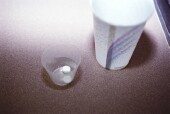
MONDAY, Feb. 11 (HealthDay News) — Many vitamin D supplements may not contain what their label says they do, a new study warns.
Some pills may pack a lot more vitamin D than the label states, and others may provide markedly less, according to the findings, published in a research letter Feb. 11 in JAMA Internal Medicine.
The researchers are more concerned by pills delivering too little of the vitamin than pills providing too much.
“It can be hard to overdose on vitamin D,” said study author Dr. Erin LeBlanc, an endocrinologist and researcher with the Kaiser Permanente Center for Health Research in Portland, Ore. However, the findings “may be a concern for those who have been told by their doctor to take vitamin D if their chosen supplement does not have the amount listed.”
Vitamin D is known as the sunshine vitamin because it is produced in response to exposure to natural sunlight. This nutrient is also added to milk and other foods, and is available in small amounts in fatty fish, beef liver, cheese, and egg yolks. Still, it can be challenging to get as much D as needed through diet, so supplements are often recommended. Some researchers have linked vitamin D deficiency to the bone disease osteoporosis, heart disease and some types of cancer.
Exactly how much vitamin D people need has been somewhat controversial in recent years. The independent, not-for-profit Institute of Medicine recommends 600 international units (IU) a day for teens and adults, or 800 IU for those older than 70. Some groups feel that this bar was set too low.
In the new study, researchers analyzed 55 over-the-counter bottles of vitamin D supplements from 12 manufacturers. They also tested vitamin D pills made at a compounding pharmacy, which creates individualized drugs. The manufacturers were unidentified.
Overall, the amount of vitamin D found in the supplements ranged from 9 percent to 146 percent of what was listed on the label.
When LeBlanc and colleagues tested five pills from the same bottle, the supplements had anywhere from 52 percent to 135 percent of the stated amounts. When five pills were averaged, however, two-thirds were within the stated range.
Although the vitamin supplement industry remains largely unregulated, some manufacturers volunteer to have the quality of their supplements tested by the independent, not-for-profit U.S. Pharmacopeial Convention (USP), which sets standards for supplements.
One of the study samples had USP verification. “Generally, the pills that were from this manufacturer were more accurate,” LeBlanc said.
Supplements from compounding pharmacies were the least accurate, LeBlanc said.
Duffy MacKay, vice president of scientific and regulatory affairs at the Council for Responsible Nutrition in Washington D.C., a trade group representing supplement manufacturers and ingredient suppliers, said that there is no excuse for supplements to deviate from their labels. Still, he said, “I am comforted that there are no safety concerns.”
Dr. Susan Zweig, an endocrinologist and clinical assistant professor of medicine at NYU Langone Medical Center in New York City, expressed more concern.
“It is hard to get toxic levels vitamin D, but it is certainly possible,” Zweig said. “Vitamin D is stored in fat so it can build up, unlike other vitamins that we pass when we urinate.” People with liver or kidney conditions may be at higher risk for vitamin D toxicity, she said.
“It is shocking how variable vitamin D is from brand to brand and pill to pill,” she added.
Zweig’s advice? “If there is any question about whether you need more vitamin D or if you are on the right dose, see your doctor and have your blood levels checked.”
MacKay said the study shows there is value in third-party certification. “Bigger and more well-known brands don’t use third parties because their seal is their brand and don’t want a ‘gotcha’ test,'” MacKay said. “Go with the seal or a brand you can trust.”
Dr. Mary Hardy of the Collaborative Centers for Integrative Medicine at the University of California, Los Angeles, said that other types of supplements have fared much worse in similar tests.
She recommends looking for a USP-verified vitamin D product. “If you are doing well and have achieved a good level of vitamin D, do not change brands arbitrarily,” she added.
More information
The U.S. National Institutes of Health has more about vitamin D.

